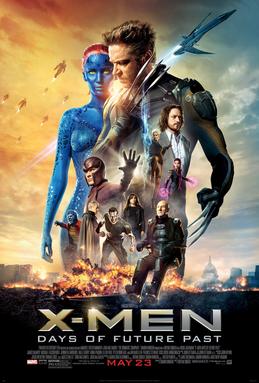Within the performances and characters, you have an overcrowded bunch. With a handful of characters appearing in two different eras alongside the various others in the respective time zones, it can make the film a bit flimsy. Some characters are in about two scenes before being taken completely out of the picture and are there just for sake of references. If anything, it's a film based around Professor X (James McAvoy and Patrick Stewart), Magneto (Michael Fassbender and Ian McKellen) and Mystique (Jennifer Lawrence), with Wolverine (Hugh Jackman) there mainly because he's the only one capable of travelling back and setting the course for the film. Plus, audiences love him, and who can blame them, but he occasionally sidelined. There's also Beast (Nicholas Hoult) who's there more as Fox's version of The Hulk - even losing control to become the blue hairball, and kinda-villain Bolivar Trask (Peter Dinklage), and sadly the two are rather sidelined within the film, as do just about all the other mutants in the dystopian future. However, all the stars give out their all, in particular the big three mentioned earlier. Lawrence is finally given the strong emotional pulls and action sequences which is lacking in The Hunger Games films, McAvoy has excellent rapport with his fellow stars, whilst Fassbender becomes the great villain set up in First Class, almost mirroring the true power of McKellen's. Out of the new characters, it's clear that Evan Peters as Quicksilver is the best, if not incredibly short-lived. He features in the best sequence of the film, with a phenomenal segment showing off his powers - the only scene worthy of the 3D format available - and adds a good balance of action and comedy.
As for the robotic Sentinels, the futuristic ones are rather chilling. Being the giant robot hunters they are, they give no remorse to what they do to their targets, and their designs are superb, as are the 70s versions. However, they too get removed for half of the film as it focuses on the character driven moments and the main plot. It's good that the film doesn't just focus on the giant murderers, but it does remove the impending doom which the dystopian era X-Men are living in, as they get removed from the film until about an hour in. The film incorporates further dismay within the future, but it's barely touched upon.
The plot, taken out of the 1981 storyline from the comics, is a strong one, with the 70s aspects thankfully not used to comedic value whilst the dystopian future does have a really dark feel to it. It does feature the overlong 'heroes and villains combined' storyline which featured in past X-Men films, but the rest of the story is good viewing and enjoyable amongst certain areas. It does feature several areas of referencing through the inclusion of certain characters future/past storylines, but at times it does integrate well within the storyline. There's also an after-credits sequence which sets up for 2016's X-Men: Apocalypse, which is very well done and succeeds in enticing viewers who waited through the credits. As for direction, Singer works best in the dystopian era when it comes to how the scene is set, as it features some beautifully terrible landscapes and lighting, amongst the purple and red powers of Bishop and Blink giving great contrasts. But in the 70s, there isn't anything particularly special. Whilst he does keep the camera in good positioning in many scenes, it doesn't give much impact. Outside of the earlier mentioned sequence with Quicksilver, it's all pretty average.
X-Men: Days of Future Past is possibly one of the better instalments in the franchise, but it's necessarily great. It's overcrowded with many faults within the storytelling in the future areas, but has the occasional high-octane sequence and strong character development to keep the film going. It's a nice return to the high levels of X2 and X-Men: First Class, but certainly isn't up there with other recent superhero films. 7/10.

No comments:
Post a Comment